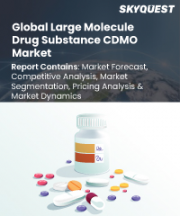
|
시장보고서
상품코드
1898254
바이오의약품 수탁제조 시장 : 시장 규모, 점유율, 성장 분석 - 서비스별, 유형별, 운용 규모별, 원료별, 분자 유형별, 지역별 업계 예측(2026-2033년)Biopharmaceuticals Contract Manufacturing Market Size, Share, and Growth Analysis, By Service (Manufacturing, Formulation & Fill-Finish), By Type, By Scale Of Operation, By Source, By Molecule Type, By Region - Industry Forecast 2026-2033 |
||||||
세계의 바이오의약품 수탁제조 시장 규모는 2024년에 178억 5,000만 달러로 평가되었고, 2025년 193억 2,000만 달러에서 2033년까지 362억 9,000만 달러로 성장할 전망입니다. 예측 기간(2026-2033년) CAGR은 8.2%로 성장이 예측되고 있습니다.
신규 의약품 개발에 대한 투자 감소, 첨단 기술에 대한 접근성, 유연성 향상, 혁신적인 제품의 시장 출시 가속화로 세계의 바이오의약품 수탁제조 시장은 크게 성장할 것으로 예측됩니다. 새로운 제조 시설의 설립에 의해 생산 능력이 강화되어, 증가하는 소비자 수요에 대응하는 것이 가능하게 됩니다. 기술 진보 및 혁신적인 바이오프로세스 기법이 주요 추진력이 되어 수탁 서비스 제공업체는 높은 생산 비용 및 배치 이행 시의 효율성 등 제조 상 과제에 대처할 수 있습니다. 또한 주요 시장 기업 간의 전략적 인수, 합병 및 제휴는 세계 수탁제조 서비스에 대한 수요 증가를 촉진하고 시장 성장을 강화하고 바이오의약품 분야에서 능력을 확대하고 있습니다.
세계의 바이오의약품 수탁제조 시장 성장 촉진요인
세계의 바이오의약품 수탁제조 시장은 제네릭 의약품에 대한 수요의 지속적인 증가 및 연구개발 활동 활성화 등 몇 가지 주요 촉진요인에 의해 성장이 예상되고 있습니다. 첨단 기술에 초점을 맞춘 투자 급증도 시장 확대에 기여하고 있습니다. 또한, 생물학적 요법 수요 증가와 핵의학 분야의 진보가 함께 시장 역학을 더욱 강화할 것으로 예측됩니다. 특수 의약품의 중요성이 높아지고 있는 것이 이 상승세를 확고히 하고 있으며, 세계의 바이오의약품 업계는 견조한 발전과 혁신의 기반을 갖추고 있으며, 가까운 미래에 시장을 변혁할 가능성이 높습니다.
세계의 바이오의약품 수탁제조 시장 성장 억제요인
세계의 바이오의약품 수탁제조 시장은 성장을 방해할 수 있는 몇 가지 과제에 직면하고 있습니다. 제조 공정과 관련된 주요 문제, 구체적으로는 표시의 불통일, 포장 상의 복잡성, 멸균의 어려움 등이 중대한 장벽이 되고 있습니다. 또한, 소비자의 신뢰 부족 및 제조 공정에 대한 지식의 부족도 시장 확대를 방해할 수 있습니다. 이러한 요인은 업계 내에서 잠재적인 투자와 제휴를 방해하는 환경을 만들어 내며, 궁극적으로 바이오의약품 수탁제조의 전반적인 발전과 성공에 영향을 미칩니다. 이해관계자들은 보다 양호한 성장 환경을 키우고 시장 신뢰를 높이기 위해 이러한 우려를 해결해야 합니다.
세계의 바이오의약품 수탁제조 시장 동향
세계의 바이오의약품 수탁제조 시장은 기술의 진보와 과학적인 탐구의 심화에 힘입어 견조한 상승세를 보이고 있습니다. 제조 현장에서 인공지능(AI)의 통합이 진행됨으로써 업무 효율이 향상되어 복잡한 생물학적 프로세스와 환자 데이터의 보다 정확한 분석이 가능해지고 있습니다. 이 기술적 변혁은 생산 주기를 효율화할 뿐만 아니라 다양한 치료 요구에 대응하는 맞춤형 의료 접근의 실현을 촉진하고 있습니다. 이해관계자가 AI 구동형 혁신의 잠재력을 의약품 개발 및 제조 공정의 최적화에 있어서 점점 인식함에 따라 효과적인 바이오의약품 솔루션에 대한 수요 증가에 견인되어 시장은 대폭적인 성장이 전망되고 있습니다.
자주 묻는 질문
목차
서문
- 조사 목적
- 조사 범위
- 정의
조사 방법
- 정보 조달
- 2차 및 1차 데이터의 방법
- 시장 규모 예측
- 시장의 전제조건 및 제한
주요 요약
- 세계 시장 전망
- 공급 및 수요 동향 분석
- 부문별 기회 분석
시장 역학 및 전망
- 시장 규모
- 시장 역학
- 성장 촉진요인 및 기회
- 성장 억제요인 및 과제
- Porter's Five Forces 분석
주요 시장 인사이트
- 중요 성공 요인
- 경쟁도
- 주요 투자 기회
- 시장 생태계
- 시장의 매력 지수(2025년)
- PESTEL 분석
- 거시경제지표
- 밸류체인 분석
- 가격 분석
- 기술 분석
- 규제 분석
- 특허 분석
- 사례 연구
- FDA 승인 바이오의약품 수탁제조 기관(CMO) 센터
세계의 바이오의약품 수탁제조 시장 규모 : 서비스별 CAGR(2026-2033년)
- 제조
- 제제, 충전 및 마무리
- 포장 및 표시
- 기타 서비스
세계의 바이오의약품 수탁제조 시장 규모 : 유형별 CAGR(2026-2033년)
- 생물학적 의약품 원약 제조
- 생물학적 제제의 제조
세계의 바이오의약품 수탁제조 시장 규모 : 운영 규모별 CAGR(2026-2033년)
- 상업 운용
- 임상 운용
세계의 바이오의약품 수탁제조 시장 규모 : 원료별 CAGR(2026-2033년)
- 포유류 발현 시스템
- 비포유류 발현 시스템
세계의 바이오의약품 수탁제조 시장 규모 : 분자 유형별 CAGR(2026-2033년)
- 단일클론항체
- 세포 및 유전자 치료
- 항체 약물 복합체
- 백신
- 치료용 펩티드 및 단백질
- 기타 분자 유형
세계의 바이오의약품 수탁제조 시장 규모 : 치유 영역별 CAGR(2026-2033년)
- 종양학
- 자가면역 질환
- 대사성 질환
- 순환기 질환
- 신경학
- 감염증
- 기타 치료 영역
세계의 바이오의약품 수탁제조 시장 규모 및 CAGR(2026-2033년)
- 북미
- 미국
- 캐나다
- 유럽
- 독일
- 스페인
- 프랑스
- 영국
- 이탈리아
- 기타 유럽
- 아시아태평양
- 중국
- 인도
- 일본
- 한국
- 기타 아시아태평양
- 라틴아메리카
- 브라질
- 기타 라틴아메리카
- 중동 및 아프리카
- GCC 국가
- 남아프리카
- 기타 중동 및 아프리카
경쟁 정보
- 상위 5개사 비교
- 주요 기업의 시장 포지셔닝(2025년)
- 주요 시장 기업이 채용한 전략
- 최근 시장 동향
- 기업의 시장 점유율 분석(2025년)
- 주요 기업의 기업 프로파일
- 기업의 상세
- 제품 포트폴리오 분석
- 기업의 부문별 점유율 분석
- 수익의 전년 대비 비교(2023-2025년)
주요 기업 프로파일
- Lonza(Switzerland)
- Thermo Fisher Scientific Inc.(US)
- WuXi Biologics(China)
- Catalent, Inc.(US)
- Samsung Biologics(South Korea)
- Boehringer Ingelheim International GmbH(Germany)
- Fujifilm Holdings Corporation(Japan)
- AbbVie Inc.(US)
- Eurofins Scientific(Luxembourg)
- GenScript Biotech Corporation(China)
- AGC Inc.(Japan)
- Merck
- KGaA(Germany)
- JSR Corporation(Japan)
- Stelis(India)
- Recipharm AB(Sweden)
- Emergent(US)
- Shanghai Fosun Pharmaceutical Co., Ltd.(China)
- Lotte Biologics(South Korea)
- Hepalink Group(China)
- Curia Global, Inc.(US)
결론 및 권고
AJY 26.01.16Global Biopharmaceuticals Contract Manufacturing Market size was valued at USD 17.85 Billion in 2024 and is poised to grow from USD 19.32 Billion in 2025 to USD 36.29 Billion by 2033, growing at a CAGR of 8.2% during the forecast period (2026-2033).
The global biopharmaceutical contract manufacturing market is poised for significant growth due to reduced investment for new drug development, access to advanced technologies, increased flexibility, and expedited market entry for innovative products. The establishment of new manufacturing facilities enhances production capacity to meet the rising consumer demand. Technological advancements and innovative bioprocessing methods are key drivers, enabling contract service providers to address manufacturing challenges such as high production costs and efficiency during batch transitions. Additionally, strategic acquisitions, mergers, and collaborations among prominent market players are fostering increased demand for contract manufacturing services worldwide, reinforcing market growth and expanding capabilities within the biopharmaceutical sector.
Top-down and bottom-up approaches were used to estimate and validate the size of the Global Biopharmaceuticals Contract Manufacturing market and to estimate the size of various other dependent submarkets. The research methodology used to estimate the market size includes the following details: The key players in the market were identified through secondary research, and their market shares in the respective regions were determined through primary and secondary research. This entire procedure includes the study of the annual and financial reports of the top market players and extensive interviews for key insights from industry leaders such as CEOs, VPs, directors, and marketing executives. All percentage shares split, and breakdowns were determined using secondary sources and verified through Primary sources. All possible parameters that affect the markets covered in this research study have been accounted for, viewed in extensive detail, verified through primary research, and analyzed to get the final quantitative and qualitative data.
Global Biopharmaceuticals Contract Manufacturing Market Segments Analysis
Global Biopharmaceuticals Contract Manufacturing Market is segmented by Service, Type, Scale Of Operation, Source, Molecule Type,TherapeuticArea and region. Based on Service, the market is segmented into Manufacturing, Formulation & Fill-Finish, Packaging & Labeling and Other Services. Based on Type, the market is segmented into Biologic Drug Substance Manufacturing and Biologic Drug Product Manufacturing. Based on Scale Of Operation, the market is segmented into Commercial Operations and Clinical Operations. Based on Source, the market is segmented into Mammalian Expression Systems and Non-Mammalian Expression Systems. Based on Molecule Type, the market is segmented into Monoclonal Antibodies, Cell & Gene Therapies, Antibody-Drug Conjugates, Vaccines, Therapeutic Peptides & Proteins and Other Molecule Types. Based on Therapeutic Area, the market is segmented into Oncology, Autoimmune Diseases, Metabolic Diseases, Cardiovascular Diseases, Neurology, Infectious Diseases and Other Therapeutic Areas. Based on region, the market is segmented into North America, Europe, Asia Pacific, Latin America and Middle East & Africa.
Driver of the Global Biopharmaceuticals Contract Manufacturing Market
The global biopharmaceuticals contract manufacturing market is poised for growth due to several key drivers, including the persistent increase in demand for generics and escalating research and development activities. A surge in investments focused on advanced technologies also contributes to market expansion. Additionally, the rising need for biological therapies, coupled with advancements in the nuclear medicine sector, is expected to further enhance market dynamics. The growing emphasis on specialty medicines serves to solidify this upward trajectory, positioning the global biopharmaceuticals landscape for robust development and innovation, which will likely transform the market in the foreseeable future.
Restraints in the Global Biopharmaceuticals Contract Manufacturing Market
The global biopharmaceuticals contract manufacturing market faces several challenges that may hinder its growth. Key issues related to the manufacturing process, including labeling inconsistencies, packaging complications, and difficulties in sterilization, are significant obstacles. Furthermore, a lack of consumer trust and limited knowledge regarding the manufacturing processes could also impede the market's expansion. These factors contribute to an environment that may deter potential investments and partnerships within the industry, ultimately affecting the overall development and success of biopharmaceutical contract manufacturing. Stakeholders must address these concerns to foster a more favorable growth landscape and enhance market confidence.
Market Trends of the Global Biopharmaceuticals Contract Manufacturing Market
The global biopharmaceuticals contract manufacturing market is witnessing a robust upward trend fueled by advancements in technology and increased scientific exploration. The growing integration of artificial intelligence (AI) within the manufacturing landscape is enhancing operational efficiencies, allowing for more accurate analysis of complex biological processes and patient data. This technological shift not only streamlines production cycles but also facilitates personalized medicine approaches, catering to a diverse range of therapeutic needs. As stakeholders increasingly recognize the potential of AI-driven innovations in optimizing drug development and manufacturing processes, the market is poised for significant growth, driven by rising demand for effective biopharmaceutical solutions.
Table of Contents
Introduction
- Objectives of the Study
- Scope of the Report
- Definitions
Research Methodology
- Information Procurement
- Secondary & Primary Data Methods
- Market Size Estimation
- Market Assumptions & Limitations
Executive Summary
- Global Market Outlook
- Supply & Demand Trend Analysis
- Segmental Opportunity Analysis
Market Dynamics & Outlook
- Market Overview
- Market Size
- Market Dynamics
- Drivers & Opportunities
- Restraints & Challenges
- Porters Analysis
- Competitive rivalry
- Threat of substitute
- Bargaining power of buyers
- Threat of new entrants
- Bargaining power of suppliers
Key Market Insights
- Key Success Factors
- Degree of Competition
- Top Investment Pockets
- Market Ecosystem
- Market Attractiveness Index, 2025
- PESTEL Analysis
- Macro-Economic Indicators
- Value Chain Analysis
- Pricing Analysis
- Technology Analysis
- Regulatory Analysis
- Patent Analysis
- Case Studies
- FDA Approved Biopharmaceuticals CMOs Centers
Global Biopharmaceuticals Contract Manufacturing Market Size by Service & CAGR (2026-2033)
- Market Overview
- Manufacturing
- Formulation & Fill-Finish
- Packaging & Labeling
- Other Services
Global Biopharmaceuticals Contract Manufacturing Market Size by Type & CAGR (2026-2033)
- Market Overview
- Biologic Drug Substance Manufacturing
- Biologic Drug Product Manufacturing
Global Biopharmaceuticals Contract Manufacturing Market Size by Scale Of Operation & CAGR (2026-2033)
- Market Overview
- Commercial Operations
- Clinical Operations
Global Biopharmaceuticals Contract Manufacturing Market Size by Source & CAGR (2026-2033)
- Market Overview
- Mammalian Expression Systems
- Non-Mammalian Expression Systems
Global Biopharmaceuticals Contract Manufacturing Market Size by Molecule Type & CAGR (2026-2033)
- Market Overview
- Monoclonal Antibodies
- Cell & Gene Therapies
- Antibody-Drug Conjugates
- Vaccines
- Therapeutic Peptides & Proteins
- Other Molecule Types
Global Biopharmaceuticals Contract Manufacturing Market Size by Therapeutic Area & CAGR (2026-2033)
- Market Overview
- Oncology
- Autoimmune Diseases
- Metabolic Diseases
- Cardiovascular Diseases
- Neurology
- Infectious Diseases
- Other Therapeutic Areas
Global Biopharmaceuticals Contract Manufacturing Market Size & CAGR (2026-2033)
- North America (Service, Type, Scale Of Operation, Source, Molecule Type, Therapeutic Area)
- US
- Canada
- Europe (Service, Type, Scale Of Operation, Source, Molecule Type, Therapeutic Area)
- Germany
- Spain
- France
- UK
- Italy
- Rest of Europe
- Asia Pacific (Service, Type, Scale Of Operation, Source, Molecule Type, Therapeutic Area)
- China
- India
- Japan
- South Korea
- Rest of Asia-Pacific
- Latin America (Service, Type, Scale Of Operation, Source, Molecule Type, Therapeutic Area)
- Brazil
- Rest of Latin America
- Middle East & Africa (Service, Type, Scale Of Operation, Source, Molecule Type, Therapeutic Area)
- GCC Countries
- South Africa
- Rest of Middle East & Africa
Competitive Intelligence
- Top 5 Player Comparison
- Market Positioning of Key Players, 2025
- Strategies Adopted by Key Market Players
- Recent Developments in the Market
- Company Market Share Analysis, 2025
- Company Profiles of All Key Players
- Company Details
- Product Portfolio Analysis
- Company's Segmental Share Analysis
- Revenue Y-O-Y Comparison (2023-2025)
Key Company Profiles
- Lonza (Switzerland)
- Company Overview
- Business Segment Overview
- Financial Updates
- Key Developments
- Thermo Fisher Scientific Inc. (US)
- Company Overview
- Business Segment Overview
- Financial Updates
- Key Developments
- WuXi Biologics (China)
- Company Overview
- Business Segment Overview
- Financial Updates
- Key Developments
- Catalent, Inc. (US)
- Company Overview
- Business Segment Overview
- Financial Updates
- Key Developments
- Samsung Biologics (South Korea)
- Company Overview
- Business Segment Overview
- Financial Updates
- Key Developments
- Boehringer Ingelheim International GmbH (Germany)
- Company Overview
- Business Segment Overview
- Financial Updates
- Key Developments
- Fujifilm Holdings Corporation (Japan)
- Company Overview
- Business Segment Overview
- Financial Updates
- Key Developments
- AbbVie Inc. (US)
- Company Overview
- Business Segment Overview
- Financial Updates
- Key Developments
- Eurofins Scientific (Luxembourg)
- Company Overview
- Business Segment Overview
- Financial Updates
- Key Developments
- GenScript Biotech Corporation (China)
- Company Overview
- Business Segment Overview
- Financial Updates
- Key Developments
- AGC Inc. (Japan)
- Company Overview
- Business Segment Overview
- Financial Updates
- Key Developments
- Merck
- Company Overview
- Business Segment Overview
- Financial Updates
- Key Developments
- KGaA (Germany)
- Company Overview
- Business Segment Overview
- Financial Updates
- Key Developments
- JSR Corporation (Japan)
- Company Overview
- Business Segment Overview
- Financial Updates
- Key Developments
- Stelis (India)
- Company Overview
- Business Segment Overview
- Financial Updates
- Key Developments
- Recipharm AB (Sweden)
- Company Overview
- Business Segment Overview
- Financial Updates
- Key Developments
- Emergent (US)
- Company Overview
- Business Segment Overview
- Financial Updates
- Key Developments
- Shanghai Fosun Pharmaceutical Co., Ltd. (China)
- Company Overview
- Business Segment Overview
- Financial Updates
- Key Developments
- Lotte Biologics (South Korea)
- Company Overview
- Business Segment Overview
- Financial Updates
- Key Developments
- Hepalink Group (China)
- Company Overview
- Business Segment Overview
- Financial Updates
- Key Developments
- Curia Global, Inc. (US)
- Company Overview
- Business Segment Overview
- Financial Updates
- Key Developments



















